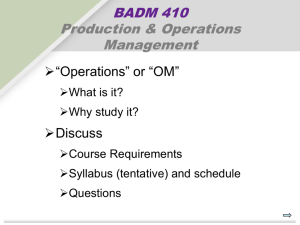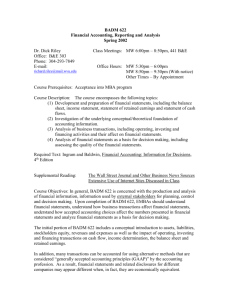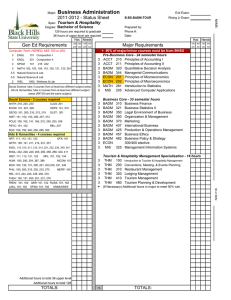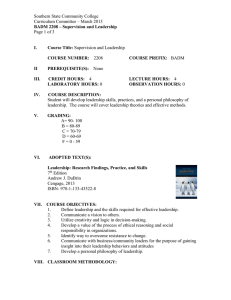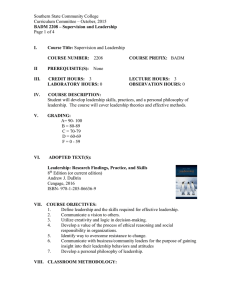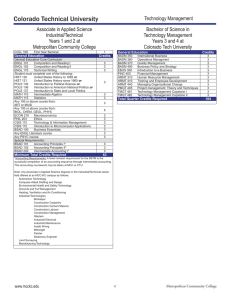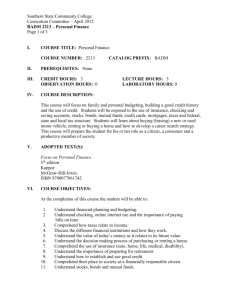www.usca.edu/SOBA
advertisement
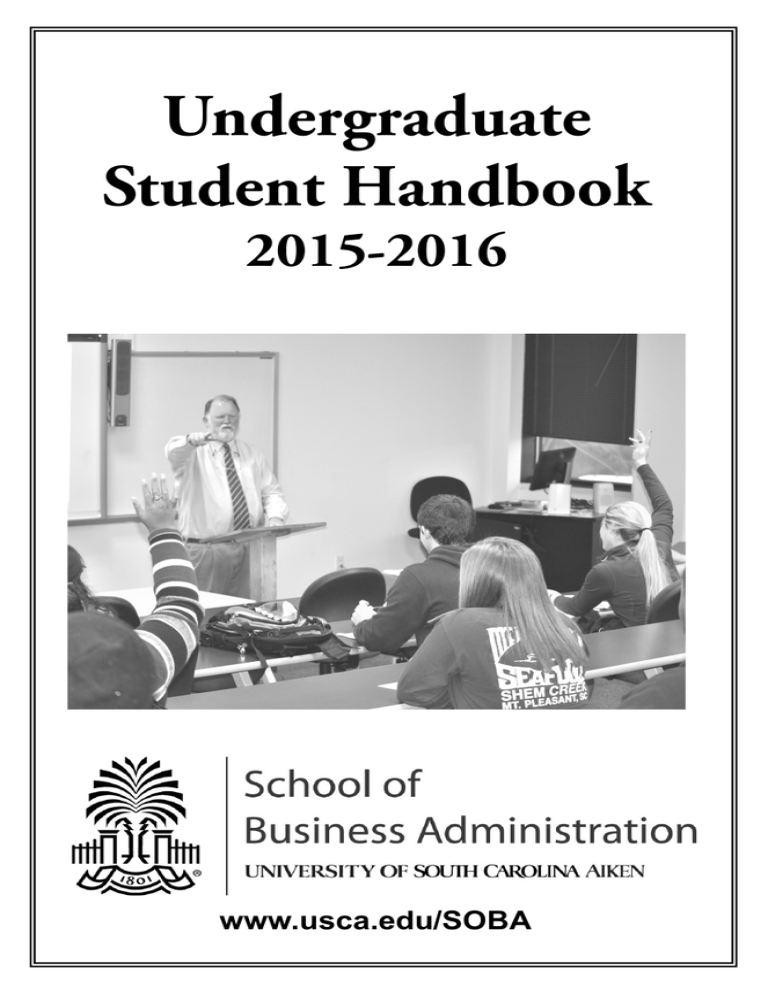
www.usca.edu/SOBA PAGE A Message from the Dean .................................................. 2 Facts about SOBA .............................................................. 3-5 SOBA Professional Program............................................... 6-7 What Courses Do I Take? ................................................... 8 Why Do I Have an Advisor .................................................. 8 Program Information. .......................................................... 9 Inter-Curricular Enrichment (ICE) and Writing Intensive Courses ............................................ 10-11 General Education Guide Sheet .................................. 12 General Education Qualifying Courses ........................ 13 Accounting .................................................................. 14 Finance ....................................................................... 15 Management ............................................................... 16 Marketing .................................................................... 17 How Do I Register for Classes? .......................................... 18 Course Titles ....................................................................... 19-21 SOBA Faculty and Staff List................................................ 22-23 Frequently Asked Questions ............................................... 24-25 SOBA Opportunities ............................................................ 26 Study Abroad with SOBA .................................................... 27-28 1 Welcome to the USC Aiken School of Business Administration! We are very excited that you have chosen to major in business administration. As USC Aiken faculty and staff, our role is to educate, develop, and serve you during your journey toward becoming an excellent, ethical, and effective leader of businesses, people, and organizations. This handbook is designed to help you through the process of completing all of the requirements for your undergraduate business degree. In addition to the general business program information, the handbook illustrates the specific requirements for each of our undergraduate business concentrations in accounting, finance, management, and marketing. Our business curriculum and degree programs are fully accredited by AACSB International, which is the premier accreditation agency for collegiate schools of business around the world. This distinction is held by less than 30% of all schools of business in the country, and less than 10% worldwide. An additional advantage of the USC Aiken program is its highly personalized experience, which is not found at larger universities. Our faculty will get to know you by name. They will offer valuable learning experiences beyond the classroom to help you develop a professional value system that promotes high ethical standards in all relationships and welcomes and appreciates diversity. We encourage you to get involved in activities outside the classroom, such as the School of Business Student Advisory Board, internships with local organizations, faculty-supervised research, and Beta Gamma Sigma, the international honor society for business students. It is our earnest desire to see you succeed and achieve your goals at USC Aiken and beyond. We are here to serve you with the integrity and respect deserved by future business professionals. If you have any questions or concerns about our program, please feel free to share them with me. My email address is mickf@usca.edu and my office phone number is 803-641-3340. With sincere regards, Michael J. “Mick” Fekula, Ph.D. Dean, USCA School of Business Administration Professor of Management Timmerman Chair in Enterprise Development 2 All School of Business Administration degree programs at the University of South Carolina Aiken are accredited by AACSB International— The Association to Advance Collegiate Schools of Business and by SACSCOC—Southern Association of Colleges and Schools Commission on Colleges. AACSB International accreditation represents the highest standard of achievement for business schools, worldwide. Institutions that earn accreditation confirm their commitment to quality and continuous improvement through a rigorous and comprehensive peer review. The mission of the University of South Carolina Aiken (USCA) School of Business Administration (SOBA) is to prepare a diverse student population – primarily from South Carolina and the Central Savannah River Area (CSRA) – for successful business careers. To accomplish our mission, we seek to create a caring learning environment that helps our students understand the global, technological, and ethical issues in today’s business world. The undergraduate business program is delivered through quality instruction in both face-to-face classroom settings as well as through an online degree completion program for place-bound or non-traditional students, while the graduate business program is delivered on a part-time basis in a face-to-face classroom setting. SOBA faculty maintain currency within their business disciplines by conducting relevant research, with a primary emphasis on peer-reviewed intellectual contributions in applied research, including both contributions to practice and learning and pedagogical research, and a secondary emphasis on discipline-based scholarship, which involves basic or theoretical research. SOBA faculty are engaged outside the University through service in scholarly and professional organizations in their disciplines as well as business consulting and training activities provided to the local community. 3 The USCA School of Business Administration will be recognized as an exemplary provider of undergraduate business education for both traditional and non-traditional students and graduate business education for non-business students in South Carolina and neighboring states. Communication: SOBA students will develop the written and oral communication skills necessary for success in their business careers. Technology: SOBA students will develop the basic technological skills to prepare them for their business careers. Globalization: SOBA students will acquire a global perspective of the modern business environment. Business Knowledge: SOBA students will acquire the basic business knowledge necessary for success in their business careers. Ethics and Social Responsibility: SOBA students will develop an appreciation for ethical decision-making, and the social responsibility of business to all stakeholders. The School of Business Administration encourages students and faculty to appreciate and welcome diversity in the global workplace. 4 The School of Business Administration at the University of South Carolina Aiken seeks to promote the highest level of ethical standards among its graduates, students, faculty, staff, and administrators. Graduates, Students, Faculty, and Administrators of the School of Business Administration should: Be forthright and truthful in dealings with all of the organization’s stakeholders. Serve as a model of ethical decision-making to others and always set and exemplify the highest standards of ethical behavior. Seek to do no harm, but when they make a mistake, admit it quickly and not try to conceal it.. Conduct all activities in good faith. Accept the consequences of their decisions and take responsibility for individual decisions and actions. Recognize the basic dignity of all by treating others as they would wish to be treated. Fulfill their philanthropic and societal responsibilities to others. The School of Business Administration offers a Bachelor of Science in Business Administration degree. Areas of concentration are accounting, finance, management, and marketing. To qualify for graduation, all Business Administration students must meet all general education requirements, business core requirements, area of concentration requirements, and complete all assessment procedures as required by the School. In addition, all Business Administration majors are required to: (i) earn a grade of C or higher in each course satisfying the Area of Concentration Requirements (excluding any Business/Economics upper level electives); (ii) earn at least a 2.0 grade point average (GPA) in all business core courses; and (iii) at least 50% of the Business Administration credit hours required for the Business Administration degree must be earned through USC Aiken. 5 Students who fulfill the admission requirements of the University may enroll in any general education courses and any business courses at the 100 or 200 level, provided they meet individual course prerequisites. The upper level business courses (300 level or higher) required for the BSBA degree comprise the SOBA Professional Program. Business Administration students must first satisfy the admission requirements listed below to be admitted into the SOBA Professional Program before they will be allowed to enroll in upper level business courses. At the end of each fall and spring semester, the academic records of business students are audited to identify those students who meet the criteria for admission into the SOBA Professional Program. There are two different ways for students to gain admission into the SOBA Professional Program. Students who meet one of these two criteria (Option #1 or Option #2) will be admitted into the SOBA Professional Program. The assessment of academic records of transfer students who enter USCA with 45 or more credit hours toward a business degree is made at the end of the semester of entry. The student who is assessed for admission into the SOBA Professional Program and is denied admittance will NOT be permitted to register for upper-level business courses (300 level and above), subject to the discretion of the SOBA Dean. This enrollment restriction will remain in force until the student has satisfied one of the two sets of criteria described above. Assessed students are notified of their admittance or non-admittance into the SOBA Professional Program. Students who are denied admittance may appeal the decision to the SOBA Dean. 6 1. The student has declared a Business Administration major. 2. The student has earned at least 45 hours of credit. 3. The student has earned a cumulative grade point average (collegiate GPA) of 2.5 or higher. 4. The student has completed the following courses: ENGL 101: Composition ENGL 102: Composition and Literature MATH 170: Finite Math ECON 221 or ECON 222: Macroeconomics or Microeconomics BADM 225: Principles of Financial Accounting BADM 290: Intro. to Info. Systems in Business (with a C or better) 1. The student has declared a Business Administration major. 2. The student has earned at least 45 hours of credit. 3. The student has earned a cumulative grade point average (collegiate GPA) of 2.0 or higher. 4. The student has completed each of the following courses with a minimum grade of C or better, and has earned an overall GPA of 2.5 or higher across these courses: ENGL 101: Composition ENGL 102: Composition and Literature MATH 170: Finite Math ECON 221 or ECON 222: Macroeconomics or Microeconomics BADM 225: Principles of Financial Accounting BADM 290: Introduction to Information Systems in Business 7 Required coursework for a business administration degree includes up to 55 hours of general education courses, 2 hours of free elective courses, and 66 hours of business courses. Course descriptions can be found in the USCA Bulletin, or Catalog (which can be found at http://web.usca.edu/records/programbulletins/index.dot). A guide sheet for each business concentration can be found on the following pages. Each contains information on course prerequisites. It is your responsibility to be sure you have met all prerequisites. You must meet with your advisor prior to registering for classes. Your advisor’s job is to help you better understand the program’s degree requirements and to advise you on the best sequence for completing courses successfully and efficiently. Your advisor can also help you to objectively explore career opportunities and goals and, in turn, assist you in assessing the value of an area of concentration for helping you achieve your career goals. Take advantage of the student/advisor relationship, but be conscious that this relationship is a shared responsibility. Your advisor is not there to tell you what to do. Your advisor is there to listen to you and help guide you in setting academic goals and pursuing those goals. Your responsibilities are to: Advisor’s responsibilities are to: Choose a major Listen to you Schedule your courses Explain things Meet degree requirements Answer your questions Schedule meetings with advisor Help you set goals Be on time and prepared for meetings Give advice regarding courses and scheduling At the very least you must meet with your advisor for advisement prior to each semester of enrollment. You may do this during the respective advisement periods for pre-registration or registration. You should meet with your advisor and request approval when you want to make a change in your schedule, such as when you want to drop or add a class. You must meet with your advisor when you make special academic requests, such as to take a transient course at another college or university including those in the USC system. Your advisor will keep copies of your advisement forms, drop/add forms, and special academic requests. You should also keep your copies too. 8 In the next few pages you will see the guide sheets for the General Education requirements and the four areas of concentration offered by SOBA. These guides will help you meet all of the program requirements in a reasonable amount of time. SOBA recommends that you take 12-15 credits each semester. Guides for General Education and the areas of concentration can be found as follows: General Education and Free Electives ...........................Pg. 12 Accounting ......................................................................Pg. 14 Finance ...........................................................................Pg. 15 Management ...................................................................Pg. 16 Marketing…………………………………………………….Pg. 17 Finally, we make the following suggestions for completing the program: Inter-Curricular Enrichment (ICE): This program consists of 16 events over your four-year college career (2 per semester). It is designed to help broaden your cultural and intellectual perspectives and promote lifelong learning. Keep track of your events and see the requirements for this program on Pgs. 10 and 11. Writing Intensive (WI): After successful completion of ENGL 101 and 102, students will complete three courses officially designated as writing intensive (WI). ENGL 201 cannot be used to satisfy this requirement. Students must take a minimum of one WI course within their major. All WI courses are designed to strengthen your writing skills. You may keep track of your WI courses on Pg.10. A list of qualifying WI courses can be found on Pg. 13. Complete the Writing Proficiency requirement: All students are required to demonstrate writing proficiency within the context of general education assessment. This can be achieved one of two ways. Students may submit a Writing Proficiency Portfolio or take the three-credit class, ENGL 201: Writing in the University. Completion of the Writing Proficiency is a prerequisite for the capstone course, BADM 478, which is taken in your last semester. You must submit your portfolio or take the class and pass with a C or better no later than the semester before you graduate. Students who do not pass the written portfolio will have to take ENGL 201. See the bulletin online and/or the Writing Room (H&SS 112) for more details. Non-Western Course: This requirement is designed to ensure that all students have some study of non-Western cultures. This does not have to be a separate course from those listed on the guide sheets. Rather, it is best to meet this requirement by combining it with another required course. A list of courses that meet this requirement can be found on Pg.13 9 Students will be required to complete ICE credits as follows: Undergraduate students will attend at least two ICE events per academic semester up to a total of 16 over their four-year college career. Freshman Convocation will constitute the first ICE event for entering freshmen. Part-time students will complete two ICE events for every 15 hours of completed course credit. Transfer students and change of campus students will be awarded ICE credits based on the number of credit hours they bring to USC Aiken, and must subsequently attend two ICE events per semester until they reach a total of 16. Students admitted to and enrolled in degree programs that are delivered entirely online will be given online options to earn ICE credits. Participation in ICE events will be recorded and monitored for each student. Students participating in university Study Abroad programs may earn two ICE credits while oversees by participating in pre-approved inter-curricular academic events. On occasion, a student may be granted special permission to receive ICE credit for attendance at an off-campus event if he/she can demonstrate an inability to attend on-campus programs. Any such exceptions must be approved in advance by the Assistant Vice Chancellor for Academic Affairs. Students may not miss regularly scheduled classes to participate in an ICE event. Students may attend only two major-specific events per 30 hours of credit. Students must complete all ICE requirements prior to graduation. Expectations for student behavior are the same at ICE events as in the classroom. A list of approved ICE events will be distributed each semester through the Office of Academic Affairs and will be available on the USCA website. After successful completion of ENGL 101 and 102, students will complete three courses officially designated as writing intensive (WI). ENGL 201 cannot be used to satisfy this requirement. Students must take a minimum of one WI course within their major. You may keep track of your WI courses below. A list of qualifying WI courses can be found on Pg. 13. Course Semester 1. 2. 3. 10 Grade Event Semester/Year 1. 2. 3. 4. 5. 6. 7. 8. 9. 10. 11. 12. 13. 14. 15. 16. 11 (see page 19 for course titles) Sem Course Grade Credit AFCI 101 (Required for Freshman only) 1 ENGL 101 (C or better required) 3 ENGL 102 (Prereq: C or better in ENGL 101. C or better required) 3 ENGL Literature Course (Prereq: C or better in ENGL 101 and 102) (May be 3 Non-Western and/or Writing Intensive) * MATH 170 (Prereq: by placement or grade of C or better in MATH 108) 3 MATH 122 (Prereq: by placement or grade of C or better in MATH 108) 3 COMM 201 (Prereq: Sophomore standing) OR COMM 241 (C or better in ENGL 102) 3 ECON 221 (Prereq: math placement above 108 or completion of MATH 108) 3 ECON 222 (Prereq: math placement above 108 or completion of MATH 108) 3 TWO Natural Sciences courses with Labs (may be Writing Intensive)* 4 4** TWO Foreign Language courses (by placement) 4** 4** ONE Social and Behavioral Science course (may be Non-Western and/or Writing Intensive) * 3 TWO Humanities courses (may be Non-Western and/or Writing Intensive) * 3 3 ONE from HIST 101 or HIST 102 3 ONE from POLI 201, HIST 201 (may be Writing Intensive) or HIST 202 (may be Writing Intensive) 3 Free Electives: Freshman: 2 hours. Transfers: 3 hours (may be Non-Western and/or Writing Intensive) * * See page 13 for qualifying courses 3 credits satisfying Non-Western* requirement____________ **Transferred 3 credit hour courses will be accepted where indicated. 12 (list is subject to change) HUMANITIES NON-WESTERN qualifying courses (cont.) Art History (ARTH): 105, 106, 206, 312, 335, 397, 398 Communications (COMM): 351, 352, 353, 450, 455, 462 English Literature (ENGL): Max. one course. 281, 282, 283, 284, 285, 286, 288, 289, 290, 291, 293, 295, 301, 362, 385, 389, 390, 391, 392, 393, 394, 395, 396, 401, 405, 407, 411, 412, 415, 416, 417, 419, 423, 424, 425, 426, 427, 428, 430, 431, 435, 449, 474, 480, 491, 494 Languages, Literatures and Culture: (FREN): 302, 303, 305, 306, 307, 388, 397, 398, 399 (GERM): 303, 305, 395, 397, 398, 399 (SPAN): 303,308, 319, 320, 321, 340, 380, 388, 397, 399, 426, 488, 498 History (HIST): All history courses* Honors (HONS): 101 Humanities (HSSI): 107, 201, 202, 211, 301 Music (MUSC): 173, 175, 371, 372, 374, 393 Philosophy (PHIL): 102, 211, 302, 303, 304, 311,312, 350, 390, 399 Religion (RELG): 101, 103, 301, 302, 390, 399 Theater (THEA): 161, 361, 362 WRITING INTENSIVE qualifying courses (bolded numbers indicate that course also qualifies as Non-Western / underlined numbers indicate that the course may also qualify as Writing Intensive) *If HIST 101 or HIST 102 is used toward the History of Civilization requirement, the same course cannot count for the Humanities requirement. Also, if HIST 201 or HIST 202 is used towards the American Political Institutions requirement, the same course cannot count for the Humanities requirement. SOCIAL SCIENCE Any courses in the following disciplines: Psychology (PSYC) Sociology (SOCY) Anthropology (ANTH) Political Science (POLI) Geography (GEOG) NON-WESTERN qualifying courses (underlined numbers indicate that the course also qualifies as Writing Intensive) Art History (ARTH): 397 Anthropology (ANTH): 102, 315, 352, 490 Communications (COMM): 450 English (ENGL): 291, 385, 435 (Continued in next column) 13 Languages, Literatures and Culture: (FREN): 303, 306, 388 (SPAN): 303, 320, 321, 380, 388, 397, 426, 488 Geography (GEOG): 102, 198 History (HIST): 345, 346, 347, 361, 362, 366, 423, 447, 492 Music (MUSC): 175 Political Science (POLI): 122, 123, 330, 344, 487,483, 492 Religion (RELG): 103 Sociology (SOCY): 410 Not all sections of these courses are Writing Intensive. Check VIP each semester for qualifying sections. (bolded numbers indicate that the course also qualifies as Non-Western) Art (ARTS): 345 Biology (BIOL): 365, 366, 370, 502, 550 Business (BADM): 345, 379, 380 (MGMT): 411 (MKTG): 455 Chemistry (CHEM): 511L, 541L, 542L Communications (COMM): 190, 332, 497, 499 Education (EDEC): 540 (EDEL): 432 (EDPY): 235 (EDRD): 518 (EDEX): 402, 425 English (ENGL): 250, 264, 283, 284, 285, 286, 288, 289, 291, 345, 360, 362, 390, 395, 405, 407, 411, 426, 427, 435, 460, 462, 464, 466 Exercise and Sports Science (EXSC): 401, 440, 458 Geology (GEOL): 102 History (HIST): 101, 201, 202, 300, 330, 331, 430, 442 Languages, Literatures and Culture: (GERM): 397 (SPAN): 316, 317, 397 Math (MATH): 518, 519, 590 Music (MUSC): 175 Nursing (NURS): 202, 308, 309, 324, 413, 421, 423 Political Science (POLI): 320 Psychology (PSYC): 328, 330, 331, 340, 341, 350, 380, 445, 465 Sociology (SOCY): 248, 410, 497 Statistics (STAT): 510 (see pages 18-20 for course titles) Lower Level Core—12 credits Sem Grade Credit BADM 225 (B or better req.) 3 BADM 226 (Prereq: C or better in BADM 225. C or better req.) 3 BADM 290 (C or better req.) 3 BADM 296 (Prereq: MATH 170, BADM 290) 3 Upper Level Core—27 credits BADM 345 ~ Writing Intensive ~ 3 (Prereq: grade of C or better in ENGL 102) BADM 350 (Prereq: ECON 221 or 222) 3 BADM 363 (Prereq: C or better in BADM 225. C or better req.) 3 BADM 371 (Prereq: Junior standing or acceptance into SOBA Prof. Prog.) 3 BADM 379 (Prereq: Junior standing) 3 BADM 383 (Prereq: BADM 350, 363, and 371) 3 BADM 390 ((Prereq: BADM 290) 3 MGMT 475 (Prereq: BADM 296, 371 and 390) 3 Concentration—24 credits (must earn C or better in all Concentration courses) BADM 478 (Prereq: BADM 350, 363, 371, Senior standing, and successful 3 completion of Writing Proficiency) *Capstone* Concentration—27 credits (must earn C or better in all Concentration courses) ACCT 321 (Prereq: or better in BADM 225) 3 ACCT 331 (Prereq: B or better in BADM 225) 3 ACCT 332 (Prereq: C or better in ACCT 331) 3 ACCT 333 (Prereq; C or better in ACCT 332) 3 ACCT 334 (Prereq: C or better in BADM 226) 3 ACCT 435 (Prereq: BADM 296 and ACCT 331) 3 ACCT 439 (Prereq: ACCT 331 and BADM 390) 3 Two from: ACCT 322 (Prereq: C or better in BADM 225 and ACCT 321); ACCT 336 (Prereq: ACCT 334); ACCT / FINA 338 (Prereq: C or better in BADM 225); ACCT 437 (Prereq: ACCT 332) 3 3 14 (see pages 18-20 for course titles) Lower Level Core—12 credits Sem Grade Credit BADM 225 (C or better req.) 3 BADM 226 (Prereq: BADM 225) 3 BADM 290 (C or better req.) 3 BADM 296 (Prereq: MATH 170, ABUS 290) 3 Upper Level Core—27 credits BADM 345 ~ Writing Intensive ~ 3 (Prereq: grade of C or better in ENGL 102) BADM 350 (Prereq: ECON 221 or 222) 3 BADM 363 (Prereq: C or better in BADM 225. C or better req.) 3 BADM 371 (Prereq: Junior standing or acceptance into SOBA Prof. Prog.) 3 BADM 379 (Prereq: Junior standing) 3 BADM 383 (Prereq: BADM 350, 363, and 371) 3 BADM 390 ((Prereq: BADM 290) 3 MGMT 475 (Prereq: BADM 296, 371 and 390) 3 BADM 478 (Prereq: BADM 350, 363, 371, Senior standing, and successful 3 completion of Writing Proficiency) *Capstone* Concentration—18 credits (must earn C or better in all Concentration courses) FINA / ACCT 338 (Prereq: C or better in BADM 225) 3 FINA 412 (Prereq: C or better in BADM 363) 3 FINA 421 (Prereq: C or better in ECON 221, 222, and BADM 363) 3 FINA 460 (Prereq: C or better in BADM 363) 3 FINA 463 (Prereq: C or better in FINA 412) 3 FINA 469 (Prereq: C or better in BADM 363) 3 Business Elective—9 credits: Any 300 and up Business or Economics course (including 300+ accounting, finance, management, and marketing courses) See Pgs. 19-21 for prerequisites. 3 3 3 15 (see pages 18-20 for course titles) Sem Lower Level Core—12 credits Grade Credit BADM 225 3 BADM 226 (Prereq: BADM 225) 3 BADM 290 (C or better req.) 3 BADM 296 (Prereq: MATH 170 and BADM 290) 3 Upper Level Core—24 credits BADM 345 ~ Writing Intensive ~ 3 (Prereq: grade of C or better in ENGL 102) BADM 350 (Prereq: ECON 221 or 222) 3 BADM 363 (Prereq: BADM 225) 3 BADM 371 (Prereq: Junior standing or acceptance into SOBA Prof. Prog.) 3 BADM 379 (Prereq: Junior standing) 3 BADM 383 (Prereq: BADM 350, 363, and 371) 3 BADM 390 (Prereq: BADM 290) 3 MGMT 475 (Prereq: BADM 296, 371 and 390) 3 BADM 478 (Prereq: BADM 350, 363, 371, Senior standing, and successful 3 completion of Writing Proficiency) *Capstone* Concentration—21 credits (must earn C or better in all Concentration courses) MGMT 374 (Prereq: Junior standing or acceptance into SOBA Prof. Prog.) 3 MGMT 376 (Prereq: Junior standing or acceptance into SOBA Prof. Prog.) 3 MGMT 473 (Prereq: BADM 371 and 350) 3 MGMT 477 (Prereq: BADM 371) 3 Three from : MGMT 378 (Prereq: Junior standing or acceptance into SOBA Prof. Prog.), MGMT 411 (Prereq: Junior standing. Coreq: BADM 383 ~Writing Intensive~), MGMT 442 (Prereq: BADM 350 and 371), BADM 380 (Prereq: BADM 350, 363, and 371), BADM 494 (Prereq: BADM 371) 3 3 3 Business Elective—6 credits: Any 300 and up Business or Economics course (including 300+ accounting, finance, management, and marketing courses) See Pgs. 19-21 for prerequisites. -6 hrs. of 429 required for Equine focus. 3 3 16 (see pages 18-20 for course titles) Lower Level Core—12 credits Sem Grade Credit BADM 225 3 BADM 226 (Prereq: BADM 225) 3 BADM 290 (C or better req.) 3 BADM 296 (Prereq: MATH 170 and BADM 290) 3 Upper Level Core—24 credits BADM 345 ~ Writing Intensive ~ 3 (Prereq: grade of C or better in ENGL 102) BADM 350 (Prereq: ECON 221 or 222) 3 BADM 363 (Prereq: BADM 225) 3 BADM 371 (Prereq: Junior standing or acceptance into SOBA Prof. Prog.) 3 BADM 379 (Prereq: Junior standing) 3 BADM 383 (Prereq: BADM 350, 363, and 371) 3 BADM 390 (Prereq: BADM 290) 3 MGMT 475 (Prereq: BADM 296, 371 and 390) 3 BADM 478 (Prereq: BADM 350, 363, 371, Senior standing, and successful 3 completion of Writing Proficiency) *Capstone* Concentration—18 credits (must earn C or better in all Concentration courses ) MKTG 454 (Prereq: BADM 350) 3 MKTG 457 (Prereq: BADM 350 and BADM 296) 3 MKTG 558 (Prereq: BADM 350 and Senior standing) 3 Three from : MKTG 353 (Prereq: BADM 350); 452 (Prereq: BADM 350); 455 (Prereq: BADM 350 ~Writing Intensive~); 459 (Prereq: BADM 226, 296, and 350); 551 (Prereq: BADM 350); BADM 429 (see Pg. 20 for prerequisites) 3 3 3 Business Elective—6 credits: Any 300 and up Business or Economics course (including 300+ accounting, finance, management, and marketing courses) See Pgs. 19-21 for prerequisites. 3 3 3 17 Step 1: USE SSC Go to SSC to find out your registration appointment time. This is the day and time when the computer will allow you to sign-up for classes. It is different from your advisement appointment, which is the time when you meet with your academic advisor. Step 2: MAKE AN APPOINTMENT WITH YOUR ADVISOR Your advisor will post on his/her office door a sign-up sheet or contact you via email for advisement meetings prior to the advisement period. You should make your advisement appointment before your registration appointment time. You cannot register until you have met with your advisor and your advising hold has been removed. Step 3: WRITE OUT THE CLASSES YOU WANT TO TAKE Review your degree requirements on page 12 and the page for your area of concentration as well as the qualifying notes on page 13. Identify the courses you want to take. Keeping in mind the prerequisites on pages 19 – 21, look at the semester schedule online and write down the acronyms and 3-digit numbers (i.e. BADM 371) for the classes you want to take. Also, identify and write down two or three alternate courses you would select if a first-choice class is full. Step 4: MEET WITH YOUR ADVISOR AT THE APPOINTED TIME AND BE ADVISED You should come to your advisement meetings prepared with the following items: Your written plans (from Step 3) Pen or pencil Your SOBA Handbook If you cannot keep your appointment, call or email your advisor ASAP and reschedule. Remember, your hold on registration cannot be removed if you are not advised. Step 5: REGISTER—ASAP There are two ways for you to register: 1. Use SSC, the on-line registration system. Go to http://my.usca.edu/. There are instructions for using SSC online. You can do this from any computer with internet access. 2. Register in person by going to the Registration Center (in the Penland Administration building). Please register for your classes on your free time. Do NOT skip class, leave early, or come late to class because you are registering. 18 Please see 2015-2016 Bulletin (online) for course descriptions AFCI 101 Critical Inquiry ECON 221 Principles of Macroeconomics (Prereq: math placement above 108 or completion of MATH 108) (Required for Freshman only) ENGL 101 Composition ECON 222 Principles of Microeconomics (C or better required) (Prereq: math placement above 108 or completion of MATH 108) ENGL 102 Composition and Literature (Prereq: C or better in ENGL 101. C or better required) HIST 101 Intro. to World Civilizations to 1750 MATH 170 Finite Mathematics HIST 102 Intro. to World Civilizations Since 1750 (Prereq: by placement or C or better in MATH 108 or consent of department) POLI 201 American National Government MATH 122 Survey of Calculus w/ Applications HIST 201 History of the U.S. from Discovery to 1865 (Prereq: by placement or C or better in MATH 108 or consent of department) HIST 202 History of the U.S. from 1865 to the Present COMM 201 Interpersonal Communication (Prereq: Sophomore standing) COMM 241 Public Speaking (Prereq: C or better in ENGL 102) Please see 2015-2016 Bulletin (online) for course descriptions BADM 225 Principles of Financial Accounting BADM 363 Business Finance (Prereq: BADM 225) BADM 226 Principles of Managerial Accounting BADM 371 Principles of Management and Leadership (Prereq: Junior standing or ac- (Prereq: BADM 225) BADM 290 Intro. to Info. Systems in Business ceptance into SOBA Professional Program) BADM 379 Social, Ethical and Legal Aspects of Business (C or better required) BADM 296 Statistics (Prereq: Junior standing) (Prereq: MATH 170, BADM 290) BADM 380 Entrepreneurship BADM 345 Business Communication (Prereq: BADM 350, 363, and 371) (Prereq: C or better in ENGL 102) BADM 383 International Business BADM 350 Principles of Marketing (Prereq: BADM 350, 363, and 371) (Prereq: ECON 221 or 222) 19 Business Course Titles (cont.) Please see 2015-2016 Bulletin (online) for course descriptions BADM 390 Business Information Management (Prereq: BADM 290) BADM 429 Internship (Prereq: Junior standing, 2.5 GPA, BADM 350, 363, 371, and approved contract with the Internship Coordinator) BADM 478 Strategic Management (Prereq: BADM 350, BADM 363, BADM 371, Senior standing, and successful completion of Writing Proficiency Portfolio requirement) BADM 494 Project Management (Prereq: BADM 371) Accounting Course Titles Please see 2015-2016 Bulletin (online) for course descriptions ACCT 321 Federal Tax Procedures ACCT 336 Managerial Accounting II (Prereq: C or better in BADM 225) (Prereq: ACCT 334) ACCT 322 Corporate Income Tax ACCT / FINA 338 Financial Statement Analysis (Prereq: C or better in BADM 225, ACCT 321) (Prereq: C or better in BADM 225) ACCT 331 Financial Accounting I ACCT 435 Auditing Theory (Prereq: B or better in BADM 225) (Prereq: BADM 296, ACCT 331) ACCT 332 Financial Accounting II ACCT 437 Advanced Accounting (Prereq: C or better in ACCT 331) (Prereq: ACCT 332) ACCT 333 Financial Accounting III ACCT 439 Accounting Information Systems (Prereq: ACCT 331, BADM 390) (Prereq: C or better in ACCT 332) ACCT 334 Managerial Accounting I (Prereq: C or better in BADM 226) Finance Course Titles Please see 2015-2016 Bulletin (online) for course descriptions FINA / ACCT 338 Financial Statement Analysis FINA 460 Capital Budgeting (Prereq: C or better in BADM 363) (Prereq: C or better in BADM 225) FINA 463 Advanced Business Finance FINA 412 Intermediate Business Finance (Prereq: C or better in FINA 412) (Prereq: C or better in BADM 363) FINA 469 Investment Analysis and Portfolio Management FINA 421 Financial Markets, Money and Banking (Prereq: C or better in ECON 221, ECON 222, BADM 363) (Prereq: C or better in BADM 363) 20 Management Course Titles Please see 2015-2016 Bulletin (online) for course descriptions MGMT 374 Human Resource Management MGMT 442 e-Business Management (Prereq: Jr. standing or acceptance into SOBA Professional Program) (Prereq: BADM 350, BADM 371) MGMT 473 Management and Operations of Small Business MGMT 376 Organization Behavior (Prereq: Jr. standing or acceptance into SOBA Professional Program) (Prereq: BADM 371, BADM 350) MGMT 475 Operations and Supply Chain Management (Prereq: BADM 296, BADM MGMT 378 Labor Relations (Prereq: Jr. standing or acceptance into SOBA Professional Program) 371, BADM 390) MGMT 477 Organization Theory MGMT 411 International Management (Prereq: BADM 371) (Prereq: Jr. standing. Coreq: BADM 383) Marketing Course Titles Please see 2015-2016 Bulletin (online) for course descriptions MKTG 353 Channels and Institutions MKTG 457 Marketing Research (Prereq: BADM 350) (Prereq: BADM 350, BADM 296) MKTG 452 International Marketing MKTG 459 Personal Selling/Sales Management (Prereq: BADM 350) (Prereq: BADM 226, BADM 296, BADM 350) MKTG 454 Promotion Strategies and Advertising MKTG 551 Retailing Management (Prereq: BADM 350) (Prereq: BADM 350) MKTG 455 Consumer Behavior MKTG 558 Marketing Management (Prereq: BADM 350) (Prereq: BADM 350, Senior standing) 21 Prof. Crystal Carlson-Myer Instructor (Accounting) Email: CrystalC@usca.edu Phone: 803-641-3350 Office: B&E 229 Dr. Kathy Mack Asst. Professor (Management) Email: KathyM@usca.edu Phone: 803-641-3231 Office: B&E 221 Prof. John Engel Instructor (Business) Email: JohnEn@usca.edu Phone: 803-641-3233 Office: B&E 220 Dr. Leanne C. McGrath Professor (Management) John M. Olin/Palmetto Professorship in Entrepreneurial Development Email: LeanneM@usca.edu Phone: 803-641-3235 Office: B&E 228 Dr. Michael J. “Mick” Fekula Dean Dr. Ravi Narayanaswamy Asst. Professor (Information Systems) Email: RaviN@usca.edu Phone: 803-641-3655 Office: B&E 101 Timmerman Chair in Enterprise Development Professor (Management) Email: MickF@usca.edu Phone: 803-641-3340 Room: B & E 223 Dr. Paul Newsom Assoc. Professor (Finance) Email: PaulN@usca.edu Phone: 803-641-3229 Office: B&E 233 Dr. David Harrison Professor (Accounting) Chair in Global Business Email: DavidH@usca.edu Phone: 803-641-3340 Office: B&E 223 Dr. Sanela Porca Professor (Economics) Email: SanelaP@usca.edu Phone: 803-641-3232 Office: B&E 225 Dr. Richard A. Heiens, III Professor (Marketing) Walter F. O’Connell/Palmetto Professorship for Director of O’Connell Center for Excellence and Technology Dr. C. Michael Ritchie Professor (Management) Email: MichaelR@usca.edu Phone: 803-641-3228 Office: B&E 231 Email: RichardH@usca.edu Phone: 803-641-3238 Office: B&E 103 Dr. Robert T. Leach Professor (Finance) Email: RobertL@usca.edu Phone: 803-641-3713 Office: B&E 226 Dr. Linda C. Rodriguez Asst. Professor (Management) Email: LindaR@usca.edu Phone: 803-641-3203 Office: B&E 230 Dr. Patsy Lewellyn Asst. Professor (Accounting) Email: PatsyL@usca.edu Phone: 803-641-3316 Office: B&E 232 Dr. Frank Xie Assoc. Professor (Marketing) Email: FrankX@usca.edu Phone: 803-641-3242 Office: B&E 106 22 Dr. Jean-Luc Grosso Professor (Economics) McDavid Professor of Business Admin. Email: jlgrosso@uscsumter.edu Phone: 803-938-3859 Office: Bus Admin. Bldg. 114 Dr. Deborah Hazzard-Robinson Visiting Asst. Professor (Management) Email: DeborahHa@usca.edu Phone: 803-775-8727 Office: Bus Admin. Bldg. 113 Dr. Hendrikus E.J.M.L. van Bulck Assoc. Professor (Business Admin.) Email: vanbulck@uscsumter.edu Phone: 803-938-3895 Office: Bus Admin. Bldg. 120 Dr. Teresa L. Smith (On sabbatical 2014-15) Professor (Management) Julian T. Buxton Professor of Bus. Admin. Email: tlsmith0@uscsumter.edu Phone: 803-938-3710 Office: Bus Admin. Bldg. 110 Aiken Campus Palmetto College Ms. Rebecca Barnwell Student Services Coordinator Email: RebeccaBa@usca.edu Phone: 803-641-3540 Office: B&E 223 Ms. Mary Claire Millies Palmetto College Advisor Email: MaryM@usca.edu Phone : 803-641-3595 Office: B&E 223 Ms. Gina Buckley Administrative Assistant Email: GinaB@usca.edu Phone: 803-641-3340 Office: B&E 223 23 25 How do I know which SOBA courses are offered on the Aiken campus or on the USC Sumter campus? SOBA’s business degree with a concentration in management is also offered through the Sumter campus. 300-level business/ economic courses taught in Sumter appear on SSC. The way to distinguish between the two campuses is to look under the “Part of Term” column. You should be able to see where the course is being offered and whether it is a full-term or half-term course. Often Aiken students mistakenly enroll in Sumter courses when switching courses or course sections after they have registered. Be sure that you are enrolling in the courses that are offered on your campus or available through Sumter online. What if a class I want is full? The first thing you should do is to see if there is another class section for the same course which is open and suitable for your schedule. If there is, change to that section. No approval is necessary for course section changes. If this is not possible, select a different class from the list of alternatives your advisor approved for you. If neither of these options are feasible, ask the appropriate department for an override. Approval is based upon seating, equipment, instructor time limitations, and other factors. What if I want to add and/or drop a class? Discuss this first with your advisor. Another signed advisement form will be required. Then you can make the change through SSC or the Registrar’s Office. Courses can only be added during the first week of classes. If you drop a class within the Schedule Adjustment Period (the first week of the semester), the course will not appear on your permanent record nor will it be counted in your accumulation of credit hours or computed into your GPA. Dropping a class after this period but prior to the last day to withdraw (see the Bulletin online for exact date), will result in a grade of W and will be recorded on your permanent record. It will not, however, be used in computing your GPA. If you have missed both of these deadlines and still want to drop a class, you will be given a grade of WF. A WF is calculated as an F and will affect your GPA negatively. Do not add a class your advisor has not approved. If you drop a class, make sure the drop is on your record on the computer for the date you dropped it. Bad things happen when students stop coming to classes they have not effectively dropped. 24 (cont.) I see School of Business online courses on SSC, but I cannot register for them. Why? Many of our online courses have been specially created for the USC Aiken Palmetto College Online Degree Completion Program. These courses are offered in a limited rotation and Palmetto College students must stick to a very rigid schedule in order to complete their degree in a timely manner. For this reason, SOBA makes every effort to ensure that Palmetto College students have the opportunity to register for the classes they need, without competing with on-campus students, who have more course options. Sometimes these courses will have space available after all of our Palmetto College students have registered, SOBA will then give oncampus students the opportunity to enroll in the special online sections according to a waiting list kept in the SOBA office (B&E 223). Students are welcome to come and add their name to the list at any time prior to classes starting. SOBA will not know the number of slots available until just before classes begin. Because adding your name to the list is not a guarantee of a seat in the course, we highly advise that students register for an alternative section or course until you have been notified that you have been given permission into the online course. Recommendation Keep copies of all forms related to advisement and registration. You never know when you may need them. Also keep copies of all course syllabi and assignments, as well as assignment papers/projects turned in. Such records may be very helpful to you at a later date. You will benefit, of course, if you have access to previous written assignments to submit for your Writing Proficiency Portfolio. 25 Internships provide students with meaningful work experiences and exposure to a field of interest. Internship placements include Crane Vending Solutions, Savannah River Nuclear Solutions, and Bridgestone. Students with a Junior or Senior standing, a 2.5 GPA or higher, and completion of basic business courses are eligible for an internship. Completion of 110 hours is required with the organization offering the internship. For more information, contact Prof. John Engel, SOBA Internship Director. Join the thousands of students and professionals who are reaping the benefits of their SAM memberships. By joining this organization you will meet management and academic leaders from around the world; share your thoughts with your peers through presentations, publications, and interactive sessions at the local and national level; and help define and guide management thinking into the future. BGS’s mission is to encourage and honor academic achievement in the study of business. Chapters of BGS are only found at schools of business that are AACSB accredited. Based solely on the institutional GPA, the top 10% of Seniors and the top 10% of second semester SOBA Juniors (75+ hours) are invited to join this prestigious honor society. Invitations are offered during the Spring semester. The Pacer Accounting Club is open to all students at USC Aiken that are interested in pursuing a career in accounting. The Pacer Accounting Club prepares its members for a successful career in accounting while providing networking opportunities with local accounting professionals, participating in community service projects, and building lasting friendships among students at USC Aiken. For more information contact, Prof. Crystal Carlson-Myer. SAB acts as a liaison between the student body and the faculty in order to create a better learning environment. SAB conducts listening exchanges with SOBA students each semester to provide feedback for assessment purposes. Membership is by appointment of the Dean of SOBA, in conjunction with the business faculty. The E. Preston Rahe, Jr., and Jerry Ann Rahe Executive in Residence Program is designed to enrich student learning and faculty development by inviting accomplished business leaders to USC Aiken to interact with students and faculty in the classroom and to deliver a special presentation to the campus community. This special presentation is an ICE event. 26 The USC Aiken Study Abroad Program gives SOBA students first-hand knowledge of the challenges and opportunities of international business. Destinations have included Italy, Germany, The Czech Republic, Slovakia, Austria, Great Britain and France. Why not earn credit hours while traveling? Coursework centers around visits to and study of international businesses, as well as national businesses. Students will tour the operations and meet and interview company management in a variety of industries abroad. Outside speakers and tours of various cities in the area are included. Optional cultural events are also available. Here are some benefits you can enjoy by being a participant in this program: You will learn about the increasingly important issues relevant to global business You will gain first-hand knowledge about international business from the experts An excellent line to put in your résumé Relatively inexpensive compared to similar programs Experience adventure and fun in a foreign country with your friends Great opportunity for making contacts and networking Structured traveling and tours Earn course credit For more information please contact: Dr. Sanela Porca B & E 225 (803) 641-3232 SanelaP@usca.edu 27 Initiated in August 2008, this program provides students the opportunity to study for a semester at the prestigious IÉSEG School of Management in Lille or Paris, France. Students not only will have the opportunity to continue their studies in a different and exciting environment, but will also be able to observe the workings of international businesses, meet other students from all over the globe, and garner the experience of a lifetime. All courses are taught in English by highly qualified international professors (10 nationalities represented). Studying at the IÉSEG School of Management is the opportunity for adventurous and curious students. Make this part of your Education here at USC Aiken. You'll never forget or regret it! For more information please contact: Dr. David Harrison B & E 227 (803) 641-3776 Davidh@usca.edu. 28 The University of South Carolina Aiken is accredited by the Southern Association of Colleges and Schools Commission on Colleges (1866 Southern Lane, Decatur, Georgia 3003-4097: Telephone number 404-679-4501) to award associate, baccalaureate, and master’s degrees. The University of South Carolina Aiken provides affirmative action and adheres to the principle of equal educational and employment opportunity without regard to race, color, religion, sex, creed, national origin, age, disability or veteran status. This policy extends to all programs and activities supported by the University. The University of South Carolina has hereby designated as the Section 504 coordinator, the University Affirmative Action Office located in the Human Services Division, University of South Carolina, Columbia, SC 29802. Any person who feels they qualify for special accommodations due to physical learning or psychological disability should contact the Office of Disability Services at (803) 641-3609 for a free, confidential interview.
